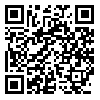Volume 17, Issue 2 (June 2019)
Iranian Rehabilitation Journal 2019, 17(2): 171-180 |
Back to browse issues page
Download citation:
BibTeX | RIS | EndNote | Medlars | ProCite | Reference Manager | RefWorks
Send citation to:



BibTeX | RIS | EndNote | Medlars | ProCite | Reference Manager | RefWorks
Send citation to:
Karimi F, Soltani M, Shaterzadeh Yazdi M J, Moradi N, Shahriari S, Latifi S M. The Effect of Knowledge of Result Feedback Timing on Speech Motor Learning in Healthy Adults. Iranian Rehabilitation Journal 2019; 17 (2) :171-180
URL: http://irj.uswr.ac.ir/article-1-938-en.html
URL: http://irj.uswr.ac.ir/article-1-938-en.html
Fateme Karimi1 

 , Majid Soltani *1
, Majid Soltani *1 

 , Mohammad Jafar Shaterzadeh Yazdi1
, Mohammad Jafar Shaterzadeh Yazdi1 

 , Negin Moradi1
, Negin Moradi1 

 , Saman Shahriari2
, Saman Shahriari2 

 , Seyed Mahmoud Latifi3
, Seyed Mahmoud Latifi3 




 , Majid Soltani *1
, Majid Soltani *1 

 , Mohammad Jafar Shaterzadeh Yazdi1
, Mohammad Jafar Shaterzadeh Yazdi1 

 , Negin Moradi1
, Negin Moradi1 

 , Saman Shahriari2
, Saman Shahriari2 

 , Seyed Mahmoud Latifi3
, Seyed Mahmoud Latifi3 


1- Musculoskeletal Rehabilitation Research Center, Ahvaz Jundishapur University of Medical Sciences, Ahvaz, Iran.
2- Department of Language and French Literature, Faculty of Letters and Humanities, Shahid Chamran University, Ahvaz, Iran.
3- Diabetes Research center, Health Research Institute, Ahvaz Jundishapur University of Medical Sciences, Ahvaz, Iran.
2- Department of Language and French Literature, Faculty of Letters and Humanities, Shahid Chamran University, Ahvaz, Iran.
3- Diabetes Research center, Health Research Institute, Ahvaz Jundishapur University of Medical Sciences, Ahvaz, Iran.
Abstract: (6119 Views)
Objectives: The current study mainly aimed at studying the effect of Knowledge of Result (KR) feedback timing and result-estimation opportunity before receiving delayed KR on learning a new speech motor skill in monolingual healthy adults.
Methods: Thirty-nine Persian healthy adults were randomly divided into three groups. Each group received immediate KR, delayed KR (after eight seconds), or delayed KR (after eight seconds) with self-estimation of the result in the delay interval. All three groups received verbal KR feedback. Participants were trained to produce a French phoneme (/ɪn/) in the context of words in four training sessions. The correct production of the target phoneme was judged by a bilingual Persian-French examiner holding an academic degree in French language teaching. Later, a transfer test and two retention tests were administered. The two retention tests were administered one day and two weeks after the last training session respectively.
Results: The effect of feedback timing on motor performance and motor learning was examined by repeated-measures ANOVA. Performance in both acquisition and retention phases was significantly different between groups (P=0.04 for both phases). One-way ANOVA was used to investigate the transfer of learning (P=0.001). Tukey test results indicated that the groups 1 and 2 were different in both acquisition and retention phases and all three groups were different in transfer test.
Discussion: The results showed that the immediate KR is beneficial for the acquisition phase, and delayed KR is more beneficial for the retention and transfer tests compared with immediate KR.
Methods: Thirty-nine Persian healthy adults were randomly divided into three groups. Each group received immediate KR, delayed KR (after eight seconds), or delayed KR (after eight seconds) with self-estimation of the result in the delay interval. All three groups received verbal KR feedback. Participants were trained to produce a French phoneme (/ɪn/) in the context of words in four training sessions. The correct production of the target phoneme was judged by a bilingual Persian-French examiner holding an academic degree in French language teaching. Later, a transfer test and two retention tests were administered. The two retention tests were administered one day and two weeks after the last training session respectively.
Results: The effect of feedback timing on motor performance and motor learning was examined by repeated-measures ANOVA. Performance in both acquisition and retention phases was significantly different between groups (P=0.04 for both phases). One-way ANOVA was used to investigate the transfer of learning (P=0.001). Tukey test results indicated that the groups 1 and 2 were different in both acquisition and retention phases and all three groups were different in transfer test.
Discussion: The results showed that the immediate KR is beneficial for the acquisition phase, and delayed KR is more beneficial for the retention and transfer tests compared with immediate KR.
Keywords: Motor learning, Knowledge of results, Result estimation, Delayed feedback, Motor speech, Immediate feedback
Article type: Original Research Articles |
Subject:
Speech therapy
Received: 2018/10/7 | Accepted: 2019/02/23 | Published: 2019/06/1
Received: 2018/10/7 | Accepted: 2019/02/23 | Published: 2019/06/1
Send email to the article author





